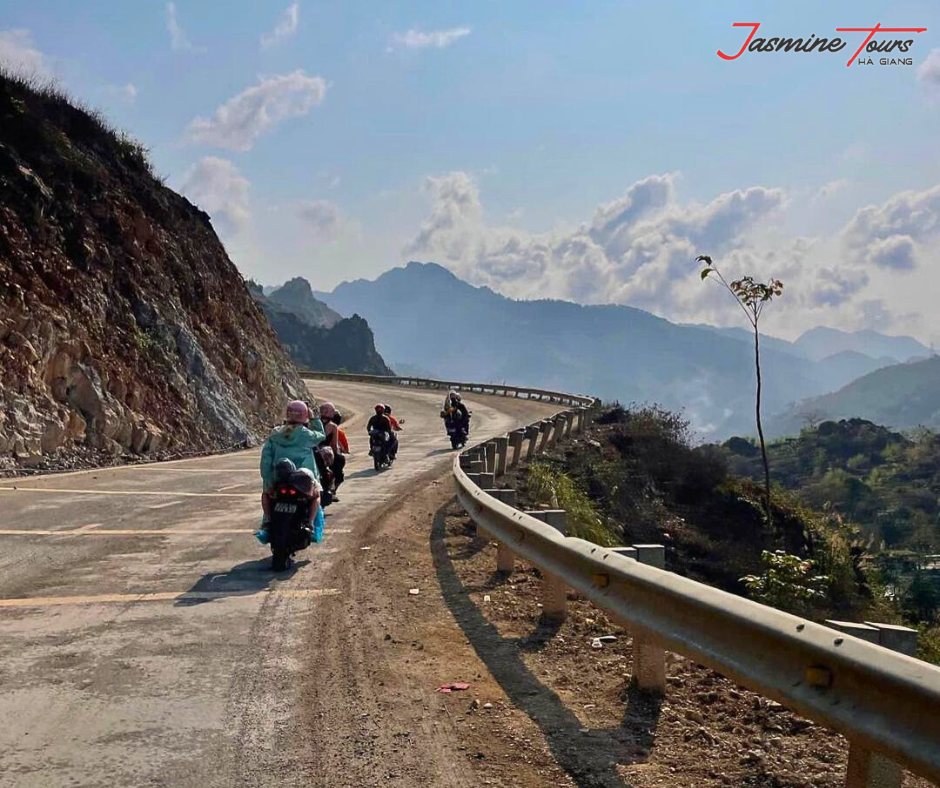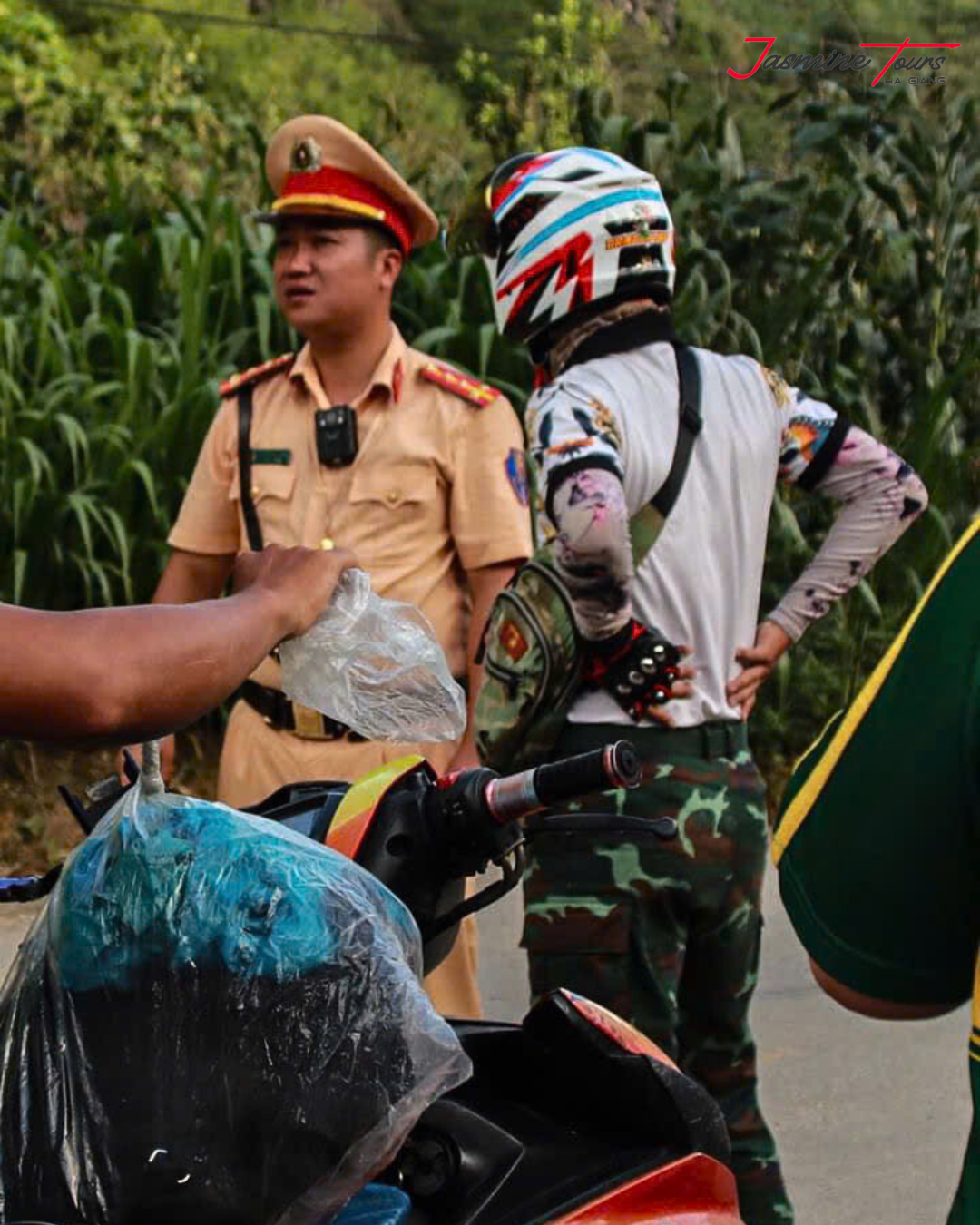Nội dung bài viết
Police checkpoints on the Ha Giang Loop exist primarily for safety and legal enforcement. The key reasons include:
Checking for valid licenses – Ensuring that riders meet Vietnam’s driving requirements.
Verifying travel permits – Some areas near the Chinese border require special permits.
Enforcing road safety – Preventing reckless driving and accidents.
Monitoring foreigners riding without proper documentation.

Unlike other parts of Vietnam, Ha Giang’s police presence is less about random fines and more about ensuring responsible travel. However, some travelers have reported being stopped and asked for money, making it essential to understand your rights.
To avoid trouble at police checkpoints on the Ha Giang Loop, ensure you have the following:
IDP with A1 or A2 category – Required for foreigners to legally ride in Vietnam.
Vietnamese motorbike license – Only necessary for long-term residents without an IDP.
Your home country’s license – Some officers may ask for this as an additional form of ID.

Read more about How to Get International Driving Permit (IDP) for Ha Giang Loop.
Rental contract – Provided by the rental company, proving ownership and permission to ride.
Vehicle registration papers (blue card copy) – Essential if the police ask for verification.
Insurance documents – Though rarely requested, having basic coverage is recommended.

Read more What to Know for Before Riding Motorbike on the Ha Giang Loop.
Certain parts of Ha Giang, especially near Lung Cu and the Chinese border, require a border permit. This can be arranged through Jasmine Tours or a local travel agency for a small fee.
Read more about Legal Requirements for Foreigners Riding on the Ha Giang Loop.
While checkpoints are not always active, common locations include:
Tam Son (Quan Ba District) – Near Heaven Gate Pass.
Yen Minh Town – Along the main road leading to Dong Van.
Dong Van Town – Close to the Dong Van Karst Plateau Geopark.
Meo Vac Town – Near the entrance of Ma Pi Leng Pass.

Most checkpoints operate during the morning and early afternoon, so riding later in the day can sometimes help you avoid unnecessary stops.
Follow these tips to handle police checkpoints efficiently:
If stopped, remain polite and respectful. Avoid nervousness, as it may lead officers to suspect something is wrong.
Hand over your passport, IDP, and rental documents confidently.
If you have a border permit, provide it when asked.
Keep photocopies of important papers to avoid losing the originals.
Watch more videos on our Youtube Channel: Jamsine Ha Giang
If an officer starts asking for unclear fees, responding in fluent Vietnamese may encourage them to continue. Instead:
Stick to basic English or act confused to discourage unnecessary interactions.
If pressured, politely insist, "I have all my documents, is there a problem?"
If asked to pay a fine, only show small bills (e.g., 50,000 – 100,000 VND).
Some travelers carry a separate wallet with limited cash to handle such situations.
If a fine seems suspicious, ask for an official receipt (biên lai). Many officers will drop the issue rather than issue an unnecessary ticket.
While rare, some officers may request unofficial fines. Here’s how to handle it:
Stay polite but firm – Avoid aggression or arguments.
Refuse to pay immediately – Ask, "Can I pay at the police station?"
Call your rental provider – If renting Jasmine Tours, contact their support team for assistance.
Wait it out – Many officers let travelers go after a few minutes if they see no easy opportunity for money.
Jasmine Tours ensures that all motorbike rentals come with proper documentation to minimize checkpoint issues.
While there’s no guaranteed way to avoid police stops, these precautions help:
Obey traffic laws – Wear a helmet, use turn signals, and follow speed limits.
Ride during off-peak hours – Early mornings or late afternoons have fewer active checkpoints.
Follow local riders – Staying behind locals at checkpoints can help avoid unnecessary stops.
Dress appropriately – Avoid looking like a reckless backpacker; wear proper gear and clothing.

If fined, follow these steps:
Check the fine amount – Traffic fines in Vietnam depends on the offense.
Request an official receipt – If it’s a legitimate fine, you will receive a ticket with payment details.
Pay at the nearest police station – If necessary, settle the fine properly instead of handing over cash at the checkpoint.
In most cases, showing the correct documents and being patient will prevent unnecessary fines.

At Jasmine Tours, we ensure all riders have the necessary documentation to pass police checkpoints smoothly. Our services include:
Properly registered motorbikes – Avoid legal issues with fully licensed bikes.
Rental contracts and insurance included – Documents to support your journey.
24/7 assistance – Call our support team if you need help at a checkpoint.
Optional guided tours – Travel with experienced local guides who handle all paperwork.
Read more about Why Travelers Choose Jasmine Tours
Police checkpoints on the Ha Giang Loop are primarily for safety and legal enforcement, not to disrupt your adventure. By carrying the correct documents, staying calm, and knowing your rights, you can easily pass through without issues.
For a worry-free experience, rent your motorbike Jasmine Tours, where we ensure all legal requirements are met so you can enjoy your Ha Giang adventure with confidence.
Plan your trip with Jasmine Tours today and let us take you on a ride through the wonders of Ha Giang.
Website: Jasmine Tours Official Website
Jeep Tour Information: Jasmine Jeep Tour Ha Giang Loop
Email: support@jasminehagiang.com
Hotline & WhatsApp (8am - 10pm):
+(84) 375 299 476
+(84) 974 205 994
Our team is ready to assist you in planning an unforgettable Ha Giang adventure.
There is 0 comment, review about How to Pass the Police Checkpoints on the Ha Giang Loop
TVQuản trị viênQuản trị viên
Xin chào quý khách. Quý khách hãy để lại bình luận, chúng tôi sẽ phản hồi sớm